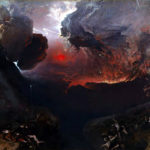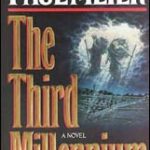Our Own Subgrene
Christians have created our own subgenre of speculative fiction: End Times fiction, the total end of the world according to biblical prophecy. I am going to state, right here at the beginning, that I have never really cared for this subgenre.
It’s not due to any theological convictions. I have no objection to stories based on an imagined fulfillment of the End Times, nor am I wedded to any particular interpretation of the biblical prophecies. Not that I’m wholly neutral – there are interpretations I lean toward, and interpretations I lean against – but I’m uncommitted to any one End Times theology. Because I don’t understand Revelation.
Oh, I understand the broad points – Man’s sin, God’s judgment, horrible calamities, the end of the world, the return of Christ, the new heaven and the new earth. But who (or what) are the two witnesses? Who (or what) is Babylon the Great, the scarlet beast, and the ten kings? What are Gog and Magog, and how do the prophecies in Ezekiel, Zechariah, and Daniel fit in with the visions of Revelation? Beats me.
So I don’t know what the End Times will look like, and deep down, I suspect that nobody else does, either. Beyond the symbolic and even esoteric nature of so much End Times prophecy, weren’t we warned that the end would come suddenly and we have to keep watch so that we will not be caught unawares? It seems to me that, if the end of the world really were easy to describe and predict, we would not be so liable to be caught unready.
In consequence, I instinctively doubt those End Times theologies that have everything explained and neatly fitted together. But one of the joys of speculative fiction is that you can enjoy ideas without finding them credible. For the sake of a good story, I’ve rolled with science I knew to be completely spurious. I can certainly roll with interpretations of the End Times I find unconvincing.
But while I feel prepared to suspend disbelief regarding the theology itself, it tends to affect the story in two ways I can’t so easily take. In the first place, End Times novels can get predictable. I’ve read Revelation and I know the inevitable plot points. I know that the powerful, charismatic leader is going to turn out to be the Anti-Christ, and that the supposed world community is an evil empire, and I know that war will follow plagues and Jerusalem will be attacked. I know that the whole world will follow the evil, charismatic, literally diabolical leader right over a cliff, and I know that the heroes will lose and lose and lose, and then the world will end, and I find it all very depressing.
Which is the second thing I don’t like about End Times novels: They can get so dreary. The end of the world is generally taken to be a depressing thing, but even worse, from the reader’s perspective, is watching the heroes fight chapter after chapter and just knowing that they are never going to win.
It may truly be said that as terrible as the end of the world would be, it should be outweighed by the creation of the  new heavens and the new earth. But again, this is a matter of the End Times in fiction, not in actual fact. I rarely find five minutes of happiness at the end of a book to be worth the long journey of misery leading up to it. C.S. Lewis, in The Last Battle, did manage to give the joys following the end of Narnia more impact than the end itself, but there are few like C.S. Lewis. (And, notably, the Narnian Apocalypse was played out on a relatively small scale.)
new heavens and the new earth. But again, this is a matter of the End Times in fiction, not in actual fact. I rarely find five minutes of happiness at the end of a book to be worth the long journey of misery leading up to it. C.S. Lewis, in The Last Battle, did manage to give the joys following the end of Narnia more impact than the end itself, but there are few like C.S. Lewis. (And, notably, the Narnian Apocalypse was played out on a relatively small scale.)
My bias against End Times fiction is not insuperable. I enjoyed the Swipe series, by Evan Angler, even after I figured out it was about the End Times. I still regret that the series appears to have been dropped unfinished, probably because DOME finally caught up with Evan Angler. But as a rule, if I learn that a novel is about the End Times, I read something else.











































What an interesting and thoughtful post, Shannon. I read the Left Behind series and enjoyed it very much, although I understood that storyline was Tim LaHaye’s interpretation of the end times. I haven’t read any other Biblical end times novels, but I have read three studies of Revelation and each one was different from the other. I’ve decided to go with what Jesus said about end times: Be ready. And that can look different for each person.
Thank you, thank you, thank you.
Great post! I LOVED Mark Carver’s version of an apocalyptic future with the Apollyon Saga. One thing Carver did was not make the series an End Times fiction but rather a fiction that had elements of the End Times theology interwoven through it, in my opinion anyway. Plus, once the story was over, there’s more on the horizon so he treated it as a moment in time and then on to something else. When I asked him if he were going to do anymore with it, he said no. Bummer!
But I agree with what you said because the language is symbolic, what do we take literally or allegorically? How do we mesh it with our own particular view of the End Times? Or, as some of others well known people have said, is there an apocalyptic event we’re waiting for? Is just the rapture and then God’s judgment and then forever with Him without the grandeur of war on earth?
We’ll see, as they say.
I think one of the most unusual End Times novels I’ve ever read is Shane Johnson’s “TheLast Guardian.”. That might be because you don’t even realize that’s what it is until well into the story. It just seems like an unusual time &/or dimensional travel story until he starts to tie up the loose ends. Is it the best written one? No. It’s decently written (IMHO); it’s the concept that was intriguing.
I think one of the most unusual End Times novels I’ve ever read is Shane Johnson’s “The Last Guardian.”. That might be because you don’t even realize that’s what it is until well into the story. It just seems like an unusual time &/or dimensional travel story with scary monsters … until he starts to tie up the loose ends. Is it the best written one? No. It’s decently written (IMHO). It’s the approach that was intriguing.
One of the most disappointing facets of End Times novels to me is their attempts to depict the New Heavens & New Earth. It’s all too depressing if they don’t try (what’s all the fighting been for?) and most often equally depressing if they do try bec ause they fail! As mentioned, C.S. Lewis comes the closest in The Last Battle because he tries to give a sense of realized wonder and joy for the characters who’ve made it to Aslan’s Country. As we all know though, there’s only one C.S. Lewis!
Oops! Not sure only the first half got sent & then my completed comment. Aha, there’s a gremlin in my tablet, that has to be it. Couldn’t *possibly* be a fumble on my part. ☺
Good article. I have serious problems with “End Times” fiction for all the reasons you noted, and also because I believe that extrapolating and expounding on the incidental details of how these end of the world might play out (a la Left Behind) can end up making the whole scenario seem even more harsh than even the Bible does — or worse, come off smug and silly.
Small nit for whoever wrote up the headline, though: it’s “subgenre”, not “subgrene”. 😀